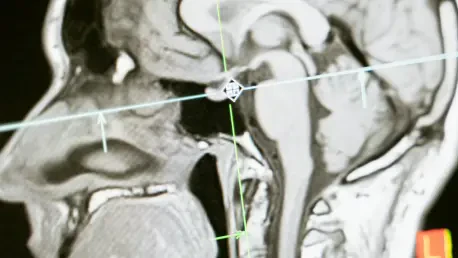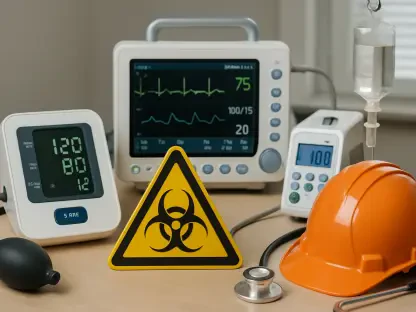The global radiation dose management market is experiencing remarkable growth, driven by advancements in artificial intelligence (AI) and the increasing need for patient safety in diagnostic imaging procedures. AI technologies are transforming healthcare by enabling systematic recording, evaluation, and adjustment of radiation doses administered during imaging tests like X-rays and CT scans. These innovations aim to balance maintaining high-quality diagnostic images while minimizing patient radiation exposure. As the market grows, it is predicted to reach a value of USD 367.64 million, with a compound annual growth rate (CAGR) of 13.36% extending from 2025. This expansion is fueled by the rising number of imaging procedures, heightened awareness of radiation risks, and stringent regulatory requirements.
AI in Radiation Dose Optimization
Revolutionizing Clinical Workflows
AI algorithms capable of predicting and optimizing radiation doses based on patient-specific characteristics have become increasingly important. As AI systems integrate into healthcare practices, they offer the capability to enhance clinical workflows significantly. By enabling real-time optimization of imaging parameters, AI ensures greater patient safety and improved patient outcomes. Healthcare facilities implementing AI in radiation dose management systems experience increased efficiency in their clinical processes. These advancements promote a shift toward value-based care with an emphasis on enhancing quality while minimizing unnecessary exposure and optimizing diagnostic accuracy.
Predictive Modeling and Data Utilization
The advancement of AI has led to the development of predictive modeling techniques that leverage historical patient data for dose management. These models analyze vast quantities of information to tailor radiation exposure according to individual patient needs. Such technology is essential for precise dose adjustments during imaging tests. AI-driven systems allow clinicians to avoid overexposure, thus safeguarding patients’ health while retaining the quality of diagnostic results. Machine learning models contribute significantly to understanding complex healthcare datasets, enabling more personalized and accurate dose management, ultimately transforming diagnostic imaging from an art into a precise science.
Market Components and Segmentation
Software Dominance and Service Growth
The radiation dose management market is divided into software and services components. Currently, software solutions hold the upper hand due to their widespread adoption. Software systems are equipped with features like real-time tracking, reporting capabilities, and compliance verification, making them indispensable in hospitals and diagnostic centers. However, service-based solutions are gaining momentum, driven by the demand for training, integration, maintenance, and support. The increasing reliance on these services underscores the need for comprehensive packages delivering practical assistance alongside technological solutions.
Applications in Oncology and Cardiology
In terms of applications, oncology remains at the forefront, demanding precise dose management due to heavy reliance on imaging techniques such as CT, X-ray, and nuclear medicine for cancer treatment. Continuous imaging elevates the risk of radiation exposure, necessitating robust management systems. Meanwhile, the cardiology segment is poised for significant growth as imaging techniques like fluoroscopy and CT angiography become prevalent in cardiovascular disease management. As technology progresses, more nuanced applications of radiation dose management will emerge within these segments, highlighting the need for adaptable AI solutions to meet evolving clinical demands.
Geographical Insights and Trends
Asia Pacific’s Rapid Expansion
The Asia Pacific region is anticipated to be the fastest-growing segment of the radiation dose management market, driven by escalating healthcare expenditures, enhanced diagnostic infrastructures, and rising awareness about radiation safety. With countries like China, India, and Japan facing an increasing prevalence of chronic illnesses, the demand for effective imaging procedures and dose management systems is surging. Japan leads the region due to its robust healthcare infrastructure and early adoption of innovative imaging technologies. This growth trajectory demonstrates the region’s eager embrace of advanced solutions to manage radiation doses and enhance patient safety.
Global Competitive Landscape
Globally, the radiation dose management market is highly dynamic, characterized by the presence of international players employing diverse strategies to boost market presence. Key strategies involve partnerships, collaborations, geographical expansions, and mergers and acquisitions. Notable companies such as GE HealthCare Technologies Inc., Siemens Healthineers, Bayer AG, and others dominate the industry, driving ongoing investment in AI enhancements. These developments highlight the constant evolution occurring within this space, fostering innovations catering to ever-changing healthcare needs worldwide.
Recent Developments and Innovations
Breakthrough Products and Regulatory Advances
Recent advancements underscore the dynamic nature of the radiation dose management market. New products, like OR Technology’s “OR dose inspector,” exemplify the ability to optimize dose recording and legal documentation compliance. Similarly, DOSIsoft SA’s “PLANET® Onco Dose version 3.2,” newly cleared by the FDA for applications in SIRT and MRT, illustrates ongoing regulatory focus. These products highlight the industry’s commitment to advancing technology solutions that improve diagnostic accuracy and regulatory adherence, promising a future where AI-driven innovations are central to radiation dose management.
Strategic Opportunities and Challenges
Understanding market dynamics reveals promising opportunities for stakeholders to enhance their strategies in radiation dose management. The integration of AI offers immense potential to improve efficiency and patient outcomes. However, it requires careful consideration of implementation challenges such as data security, ethical concerns, and system integration. Stakeholders must navigate these complexities while fostering innovation to maintain competitive advantages within this evolving field. The path forward involves collaborative efforts among healthcare providers, technology developers, and regulatory bodies to create solutions that prioritize patient safety and expand access to cutting-edge technologies.
Strategic Insights for the Future
AI algorithms have become vital tools in medical settings, particularly for predicting and optimizing radiation doses tailored to the unique characteristics of each patient. As these AI systems become entrenched in healthcare workflows, they bring profound enhancements to clinical processes. By facilitating the real-time optimization of imaging parameters, artificial intelligence plays a crucial role in bolstering patient safety and refining patient outcomes. Facilities that adopt AI-driven radiation dose management systems gain improved efficiency in their clinical operations. These technological advancements are pivotal in shifting healthcare toward a value-based care model, where the focus lies on elevating the quality of care while simultaneously reducing unnecessary exposure to radiation and sharpening diagnostic precision. This move toward value-based care reflects a broader industry trend, emphasizing the importance of delivering superior care with optimal resource utilization. As a result, healthcare professionals can better meet patients’ needs, offering more precise diagnoses and treatments while minimizing potential risks. This transition not only optimizes clinical workflows but also contributes to the overall enhancement of patient-centered care, strengthening the healthcare system’s ability to offer safer and more accurate services for everyone.









